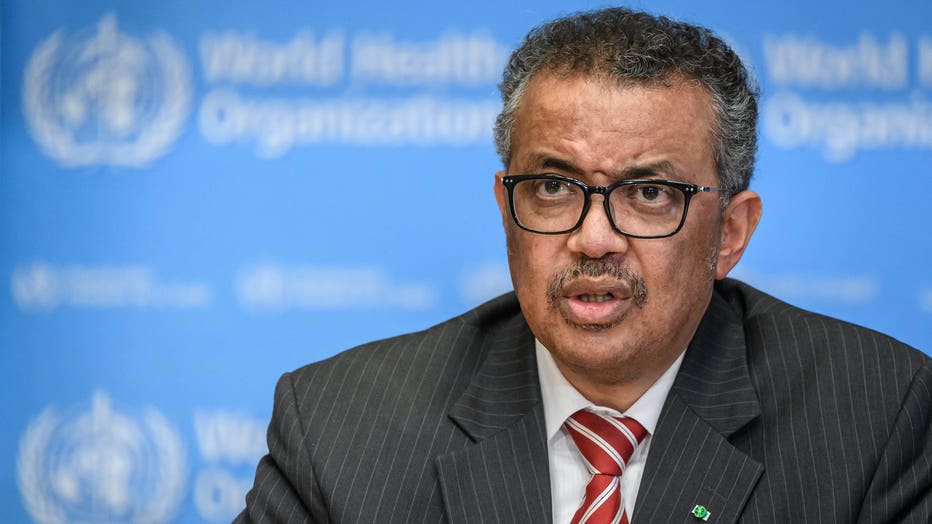WHO warns of 'new and dangerous' coronavirus pandemic phase as case counts climb globally
GENEVA - The world is entering a “new and dangerous phase” in the coronavirus pandemic, and political leaders must come together to fight it, the head of the World Health Organization said.
"The pandemic is accelerating," WHO Director-General Dr. Tedros Adhanom Ghebreyesus warned June 19. One day prior, more than 150,000 new cases of COVID-19 were reported to the organization — the largest single-day increase in cases the agency had received since the outbreak began.
Nearly half of those cases were reported in the Americas, though “large numbers” came from South Asia and the Middle East.
“Many people are understandably fed up with being at home. Countries are understandably eager to open up their societies and economies,” Ghebreyesus told reporters. “But the virus is still spreading fast, it’s still deadly, and most people are still susceptible.”

World Health Organization (WHO) Director-General Tedros Adhanom Ghebreyesus attends a daily press briefing on COVID-19 at the WHO headquarters on March 11, 2020 in Geneva. (Photo by FABRICE COFFRINI/AFP via Getty Images)
As of June 22, more than 9 million people around the world had been infected with COVID-19 and about 470,000 had died, according to data compiled by Johns Hopkins University. But experts say the actual numbers are believed to be much higher because of limited testing and cases in which patients had no symptoms.
The WHO chief repeated his call for countries and people to “exercise extreme vigilance,” and to focus on efforts to contain the virus, including testing and contact tracing.
Ghebreyesus also warned Monday against “politicizing” the pandemic.
“The greatest threat we face now is not the virus itself, it’s the lack of global solidarity and global leadership,” he said. “We cannot defeat this pandemic with a divided world,” he said during a video conference for the Dubai-based World Government Summit.
Ghebreyesus, who has faced criticism from President Donald Trump, said during the video conference that it took over three months for the world to see 1 million confirmed infections, but just eight days to see the most recent 1 million cases.
Trump has criticized the WHO for its early response to the outbreak and what he considers its excessive praise of China, where the outbreak began, though his own administration’s response in the U.S. has come under attack. Trump also announced in May that the U.S. would terminate its relationship with the organization.
RELATED: US cuts World Health Organization ties over virus response
In the U.S., surging coronavirus cases reported in states like Florida, Arizona, Alabama, Texas and South Carolina have raised fears that the progress won after months of lockdowns may be slipping away.
“It is snowballing,” said Dr. Marc Boom, CEO and president of Houston Methodist Hospital, noting that the number of hospitalizations in the Texas Medical Center system has more than doubled since Memorial Day. “If we don’t do what we can RIGHT NOW as a community to stop the spread, the virus will take our choices away from us.”
RELATED: Florida coronavirus cases top 100,000 as spike continues; 2,926 new cases reported Monday
The number of newly confirmed coronavirus cases across the country per day has reached more than 26,000, up from about 21,000 two weeks ago, according to Johns Hopkins University data analyzed by the Associated Press. More than 120,000 deaths in the U.S. have been blamed on the virus.
Dr. Michael Ryan, the World Health Organization's emergencies chief, echoed Ghebreyesus' message on Monday that the outbreak is “definitely accelerating” in the U.S. and a number of other countries. He also dismissed the notion that the record daily levels of new COVID-19 cases simply reflect more testing, nothing that several countries have also reported increases in hospital admissions and deaths.
“The epidemic is now peaking or moving towards a peak in a number of large countries," Ryan warned.
Meanwhile, companies around the world are racing to find a vaccine — and there is fierce debate over how to make sure it is distributed fairly. WHO's special envoy on COVID-19, Dr. David Nabarro, said he believes it will be “2 1/2 years until there will be vaccine for everybody in the world.”
This story was reported from Cincinnati. The Associated Press contributed.

